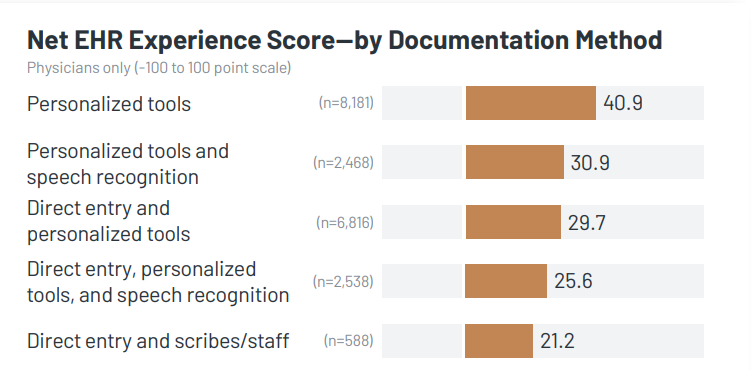
@ShahidNShah


Since the Arch Collaborative’s early days, analysis of clinician feedback has identified three pillars key to EHR satisfaction: (1) strong user mastery, (2) an organization-wide sense of shared ownership, and (3) EHR technology that meets users’ unique needs (personalization). This last pillar is the focus of this report. While it is important for physicians to have the flexibility to care for patients and document in a way that fits their workflow, too much freedom to change the EHR can hinder efficiency and patient safety. This report identifies the benefits of personalization as well as best practices for leveraging it.
Except for physicians who utilize both dictation/transcription and direct entry, those who rely solely on one documentation method, regardless of its nature, generally report lower levels of burnout. Furthermore, physicians employing multiple documentation approaches are more prone to attribute their burnout to after-hours charting compared to those employing a single documentation method. As previously mentioned, physicians using dictation/transcription or speech recognition tend to experience reduced burnout but not an increase in EHR satisfaction, likely due to these methods disconnecting users from the EHR rather than promoting mastery of it.
Read on hitconsultant.net
This report explores the impact of EHR personalization on physician satisfaction and efficacy in 2023. Three key pillars of EHR satisfaction are identified: strong user mastery, a sense of shared ownership within organizations, and personalized EHR technology. Physicians who utilize personalized tools for EHR documentation report significantly higher satisfaction, as measured by the Net EHR Experience score (NEES), showcasing their commitment to mastering the technology. However, the use of multiple documentation methods, except for a combination of dictation/transcription and direct entry, is associated with increased burnout. Effective documentation training programs are crucial for organizations looking to enhance EHR satisfaction, as there is a substantial NEES score gap of at least 30 points between physicians who find their training satisfactory and those who do not. Overall, this report underscores the importance of EHR personalization and effective training in optimizing physician satisfaction and efficiency in healthcare settings.
Continue reading at hitconsultant.net
The University of Rochester has developed an AI tool for remote assessment of Parkinson's disease severity. Users complete a finger-tapping task in front of a webcam, and the AI provides rapid …
Posted Sep 11, 2023 Nervous System Diseases Neurologists Primary Care Artificial Intelligence #healthequity
Connecting innovation decision makers to authoritative information, institutions, people and insights.
Medigy accurately delivers healthcare and technology information, news and insight from around the world.
Medigy surfaces the world's best crowdsourced health tech offerings with social interactions and peer reviews.
© 2025 Netspective Foundation, Inc. All Rights Reserved.
Built on Apr 17, 2025 at 6:07am